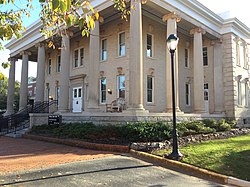Table of Contents
Introduction to the University of Georgia ELC
As a student of the University of Georgia ELC, I know for a fact how much of an impact the ELC has made in terms of us practicing our language, also considering that students have ready access to widespread American culture. But like every institution with more than a few learners enrolled, some recent changes to the program have started a buzz around the university and the surrounding areas for this and other unsaid reasons.
With a lot of the people interested in the matter already talking about it, this seems like a good time to understand how those changes could affect learners in the long run and the community around this venerable institution, and form an informed conclusion from the discussion already happening. It is time for us to analyze what is going on at the University of Georgia ELC and assess its importance in the present-day reasoning.
Recent Changes in the university of georgia elc

Recently, the University of Georgia ELC made significant changes to the program that have become a topic of conversation among the students and the faculty. Enhanced curriculum framework, new electives, and altered degree requirements were all part of the modifications. A remarkable change is the use of technology to supplement the teaching of pre-recorded materials. The goal of this shift is to improve student participation through the use of technology for digital activities.
Potential Impact on Students and the Community
The recent alterations at the University caused a sudden storm of emotions among the students attending the university. There were extreme changes that made many students anxious about the consequences of the change on their educational path. The students depend on the ELC for assistance, instruction, and tools that will help them improve their education, and within the learning environment. So, any disruption may cause great damage to the students’ academic achievement and general health. In addition to personal issues, there is some sort of collective impact on society as well.
The ELC has been known for a very long time as a primary center of educational services and students collaborating with local community and culture organizations. Changes to its programs may reduce the number of offered services for student practice or civic activities.
Local community businessmen associated with the university may also encounter difficulties, as there is a decline in student participation. This striking example demonstrates the importance of the ELC not only for students but for the entire Athens society, which is based on coexistence and collaboration.
University Response and Explanation of Changes
The University of Georgia ELC has come under fire for its program changes. In response, college officials have released their explanations to further clarify their statements regarding the intentions. Administrators highlight the focus on the shifts augmenting educational value in tandem with new developments within the industry. They claim these revisions will enhance students’ chances of acquiring jobs in the coming years.
In addition, the University has expressed willingness to engage with other stakeholders which including students, faculty, and members of the community. Town hall meetings have already been scheduled to tackle the issues head-on. They emphasize upholding their promise to execute an uninterrupted policy. While the feedback is still flooding in, there is flexibility to change in regards to program design out of community and academic needs.
Comparing the University of Georgia ELc to the other University of Georgia ELc program
Unique in its modernization and curriculum scope, ELC The University of Georgia ELC is different than a typical university program because it accommodates various learning styles.
While many colleges tend to focus on the theoretical methods of teaching a language, the University of Georgia ELC combines theory and practical training, encouraging students to apply skills learned in real-world scenarios as well. This promotes student engagement. In addition, immersion activities by the university enhance the overall experience for students, which most other programs do not offer.
In addition, faculty expertise at the University of Georgia ELC is remarkable. Many of the instructors have seasoned international experience, which adds to their overseas training. UGA is among the few institutions with tailor-made services offered to the students, and this propels the university to the head of the list when support services are considered.
Moving Forward: Suggestions for Improvements and Addressing Concerns
For a more favorable atmosphere at work, the ELC of the University of Georgia should strive to engage with students and faculty in the much-needed two-way communication. Through regular forums or meetings, platforms can be designed to tailor to host everyone’s voice. Mechanisms of collecting data for feedback should be initiated. In the case of capturing student sentiments on program changes, qualitative and quantitative methods such as surveys, will go a long way in achieving results.
Such data provides recommendations for the decisions to be made in the future. Apart from the improvement of other programs, transforming academic resources can be an additional area of focus. Alleviating the learning experience by updating the materials being taught in this day and age, along with technology. Investing at the level of the community can also prove to bring in benefits. Programs aimed at discussing the needs of the community with the leaders of the community, as is the case, carve out avenues for mutual relationships.
To achieve optimal implementation of the changes designed, staff training that aligns everyone on the goals and responsibilities needs to be done. For an organization, in this case, the ELC, it is best for worries to be dealt with early. This, while maintaining the required standards of services offered in education, ensures a suitable avenue for the future.
Conclusion and Final Thoughts on the Future of the university of georgia elc Program
As it stands, the university seems to be inactive in paying attention to and communicating adequately with those who are impacted by the changes. Effective communication can be very helpful in aiding the rebuilding of trust, where students are and feel adequately listened to.
Best combinatorial approaches that work with other concerned institutions may be a good starting point for the University of Georgia ELC to explore. Considering their successes and struggles will enable the development of these programs while considering the specific needs of students. There has to be a joint effort in strategizing with the administration, faculty, students, as well as alumni, which leads to a cultivated educational system that seeks to preserve and integrate innovation with traditional approaches.
Facilitating transition is not an easy endeavor as it always seems complicated; however, drawing upon careful consideration and inclusivity stands the chance for improvement in the previously discussed ways—and many ways believed to be inconceivable—for faculty and personnel of the University of Georgia ELC.
